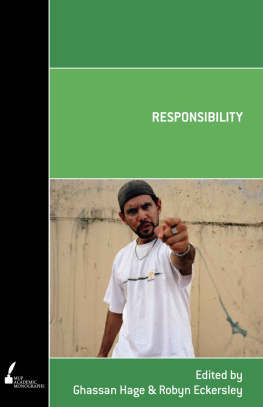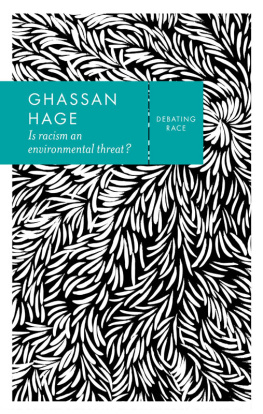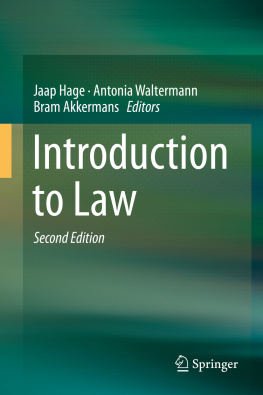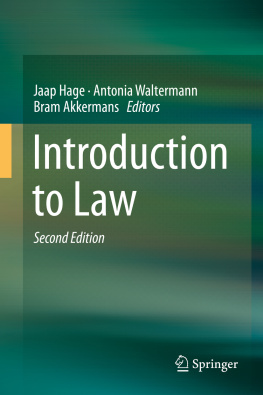Ghassan Hage - Responsibility
Here you can read online Ghassan Hage - Responsibility full text of the book (entire story) in english for free. Download pdf and epub, get meaning, cover and reviews about this ebook. year: 2012, publisher: Melbourne University Publishing, genre: Politics. Description of the work, (preface) as well as reviews are available. Best literature library LitArk.com created for fans of good reading and offers a wide selection of genres:
Romance novel
Science fiction
Adventure
Detective
Science
History
Home and family
Prose
Art
Politics
Computer
Non-fiction
Religion
Business
Children
Humor
Choose a favorite category and find really read worthwhile books. Enjoy immersion in the world of imagination, feel the emotions of the characters or learn something new for yourself, make an fascinating discovery.
- Book:Responsibility
- Author:
- Publisher:Melbourne University Publishing
- Genre:
- Year:2012
- Rating:4 / 5
- Favourites:Add to favourites
- Your mark:
- 80
- 1
- 2
- 3
- 4
- 5
Responsibility: summary, description and annotation
We offer to read an annotation, description, summary or preface (depends on what the author of the book "Responsibility" wrote himself). If you haven't found the necessary information about the book — write in the comments, we will try to find it.
Responsibility — read online for free the complete book (whole text) full work
Below is the text of the book, divided by pages. System saving the place of the last page read, allows you to conveniently read the book "Responsibility" online for free, without having to search again every time where you left off. Put a bookmark, and you can go to the page where you finished reading at any time.
Font size:
Interval:
Bookmark:
Responsibility
Responsibility
Edited by Ghassan Hage & Robyn Eckersley

Contents
Preface
As with the MUP volumes that preceded it, Waiting (2009) and Force, Movement, Intensity (2011), the making of this volume was a genuinely collective effort and pure intellectual pleasure. The volume marks the Department of Anthropologys move to join the School of Social and Political Sciences at the University of Melbourne. It therefore represented an instance of the new Schools coming together intellectually as well as institutionally. So I am particularly happy that Robyn Eckersley from the Department of Political Sciences has agreed to join me as a co-editor of the volume. It is not without some pride that I note that this is a very strong volume that can only reflect the strength of the School itself. I am thankful for MUP press, and particularly Elisa Berg, for the enthusiasm and efficiency with which the manuscript has been received and produced.
Ghassan Hage
Introduction
The language of responsibility permeates social life. While it has many meanings, several of which are examined by the authors of this book, its everyday usage is more often than not closely associated with questions of causality and the formal/legal, or informal, attribution of liability. This usage refers predominantly to human action. Although we do speak of responsibility in relation to non-humans, such as the faulty wires were responsible for the fire, faulty wires can only be declared responsible, they cannot be, in our culture, held responsible as humans are. For, in the case of humans, responsibility not only denotes causality but also includes questions of duty, accountability and morality. One can say that only in the latter meaning is responsibility true to its etymological roots in the Latin word respondeo , which highlights the question of answerability.
Interestingly, in Arabic, responsibility is derived etymologically from the word question rather than answer. Almassool , the person responsible, also means, literally, the person who is asked a question. So in both linguistic traditions the emphasis is on the ability to reflect on ones action which is implied in both the capacity to answer and the capacity to be questioned. These meanings are at the core of the modern conception of responsibility, which implies both a capacity to be accountablethis necessarily includes some notion of free willand a capacity to reflect on this accountability. Very few other concepts touch on so many essential dimensions of our daily lives as this human-centred conception of responsibility. All spheres of belonging that encompass our social being are delimited by explicit or implicit attempts at defining, assigning, assuming, questioning or resisting such conceptions of responsibilities and their scope. This is so whether we are speaking of our belonging to the family or the nation, or of our belonging to workplaces and social clubs.
Even more fundamentally, humans in many cultures have considered that the capacity to assume responsibility for ones action is at the heart of what distinguishes us as humans. This is done by highlighting the relation between responsibility and free will and by positing both as core markers of the boundary between humans and animals; or indeed between the human and everything else. Only those who have free will are or can be made answerable for their actions and only humans have free will, or so this tale goes. Like many human-created and deployed boundaries between the human and the animalsuch as those erected around notions of rationality, for examplethey are also used to demarcate differences between humans themselves.
Here the pattern of argumentation travels a well-trodden colonial and patriarchal route: whites have been considered more responsible than blacks, who easily allow themselves to be guided by their instincts. Men are more responsible than women for, as some societies have it, women are a bit like blacks in being guided by their instincts and their emotions, or, as some other societies have it, responsibility is a capacity for self-control and women, biologically, do not have this capacity: they cannot control the boundaries between the inside and outside of their bodies, they menstruate. And, of course, adults are more responsible then children (which is why blacksand womenare like children).
With this last discursive formation, the boundary shifts from being only socio-spatial to being also diachronic. Most of us, at some point in our childhood, have been told by an adult that the time has come where we have to assume responsibility for our actions. When and why is there such a time is in itself an interesting bio-social question. What is certain is that, like all socially constructed inter-human and inter-species boundaries, the social threshold between responsibility and the lack of it is continuously shifting. Even the division between humans who can assume responsibility for their action and animals who cant is not as stable as it is often believed to be. While it is hard for many people today to imagine animals being formally held responsible for their action, this has not always been the case. As the well-documented history of animal trials in medieval Europe attests, animals were not only seen as informally responsible but were also held legally responsible, taken to court and put on trial. And as pet owners know only too well, while they would not be likely to argue the case that animals should be held responsible for their action, if on arriving home they find that their pet has done something to displease them, their first instinct is indeed to hold them responsible.
Despite the way it pervades social life, responsibility is actually a thoroughly modern concept. Consequently, as Paul Ricoeur indicates in his seminal essay on responsibility, in the Western philosophical tradition the term only makes an explicit appearance in post-Kantian philosophy. Nonetheless, philosophers have always addressed closely related themes, starting with Aristotles reflections in his Nicomachean Ethics on when it is appropriate to consider a person liable for the consequences of his or her action, and under what conditions should the person be perceived as blameless. Kants deliberations on the relation between morality and rationality, and his reflections on the relation between intention and action are seen today as a way of thinking responsibility. This also goes for Nietzsches conception of humankind as the animal that has the right to promise, which is taken up later by Hannah Arendts The Human Condition , where she also posits responsibility as a key differentiator between humans and animals. The question of responsibility is even more foundational in Jean Paul Sartres existentialism, which sees us as condemned to be free and always faced with the responsibility of assuming our freedom. Since then hardly a philosopher has not confronted the question of responsibility.
Because of its modern beginnings the question of responsibility has been explicitly present as a concept in the social sciences right from the start. Indeed it has been at the core of the basic explanatory/determinist impulse of social scientific inquiry: how can one proclaim an individual responsible and yet analyse them and their actions as constituted by a variety of social forces? Durkheim and his entourage dealt explicitly with questions of this kind. But unlike others who took responsibility as a starting point along with the assumption of absence of determination it carries with it, Durkheim favoured taking the existence of a sentiment of responsibility as given and asked questions concerning its nature and its impact. Whether we objectively have such a thing as free will is certainly open to debate, but the existence of a sentiment of responsibility is not.
Next pageFont size:
Interval:
Bookmark:
Similar books «Responsibility»
Look at similar books to Responsibility. We have selected literature similar in name and meaning in the hope of providing readers with more options to find new, interesting, not yet read works.
Discussion, reviews of the book Responsibility and just readers' own opinions. Leave your comments, write what you think about the work, its meaning or the main characters. Specify what exactly you liked and what you didn't like, and why you think so.









